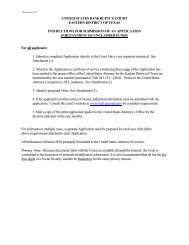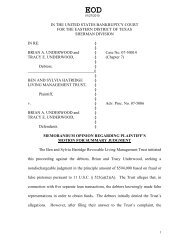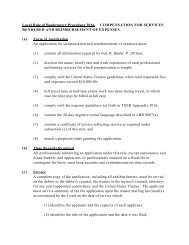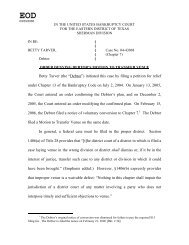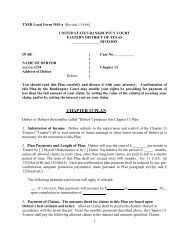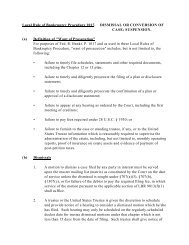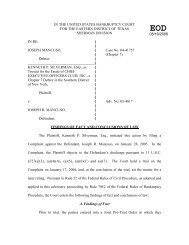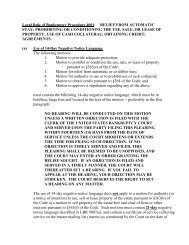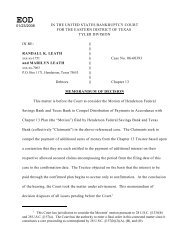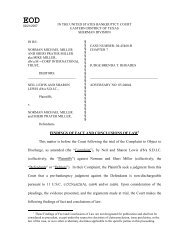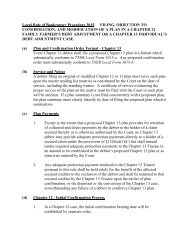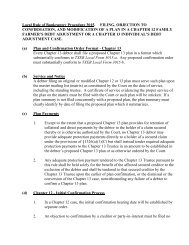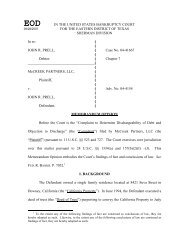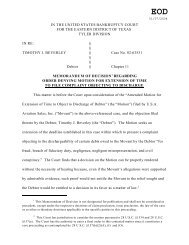TWL CORPORATION, et al. - Eastern District of Texas
TWL CORPORATION, et al. - Eastern District of Texas
TWL CORPORATION, et al. - Eastern District of Texas
Create successful ePaper yourself
Turn your PDF publications into a flip-book with our unique Google optimized e-Paper software.
and the other courts <strong>of</strong> appe<strong>al</strong>s are split. See, e.g., Gentry v. Circuit City Stores, Inc. (In<br />
re Circuit City Stores, Inc.), 439 B.R. 652, 658 fn. 5 (E.D. V.A. 2010) (collecting<br />
authority). Courts within the Fifth Circuit have issued conflicting decisions on wh<strong>et</strong>her<br />
to permit class pro<strong>of</strong>s <strong>of</strong> claim. See In re Entergy New Orleans, Inc., 353 B.R. 474<br />
(Bankr. E.D. La. 2006) (refusing to permit a class pro<strong>of</strong> <strong>of</strong> claim where rate-related<br />
claims that putative class representatives sought to assert were the subject <strong>of</strong> extensive<br />
proceedings <strong>al</strong>ready underway before proper administrative bodies and in state courts); In<br />
re Craft, 321 B.R. 189 (Bankr. N.D. Tex. 2005) (refusing to permit a class pro<strong>of</strong> <strong>of</strong> claim<br />
in a Chapter 11 case where the class had not been certified prior to bankruptcy and it<br />
would have prejudiced the debtor and other creditors to delay confirmation in order to<br />
conduct a certification hearing); Kahler v. FIRSTPLUS Financi<strong>al</strong>, Inc. (In re FIRSTPLUS<br />
Financi<strong>al</strong>, Inc.), 248 B.R. 60, 67 (Bankr. N.D. Tex. 2000) (holding that a putative<br />
representative may not file a pro<strong>of</strong> <strong>of</strong> claim on beh<strong>al</strong>f <strong>of</strong> a proposed class); Wilson v.<br />
V<strong>al</strong>ley Elec. Membership Corp., 141 B.R. 309, 312 (E.D. La. 1992) (holding that a<br />
representative may file a pro<strong>of</strong> <strong>of</strong> claim on beh<strong>al</strong>f <strong>of</strong> a purported class). See <strong>al</strong>so Adair v.<br />
Bartholow (In re Great Western Cities, Inc. <strong>of</strong> New Mexico, <strong>et</strong> <strong>al</strong>.), 107 B.R. 116, 118<br />
(N.D. Tex. 1989) (distinguishing class claims from group claims). Cf. Updike v. Kitty<br />
Hawk Cargo, Inc., Adv. No. 07-4179 (Bankr. N.D. Tex. July 22, 2008) (granting WARN<br />
Act claimants’ motion for class certification based upon consent <strong>of</strong> the parties).<br />
In those circuits that permit class pro<strong>of</strong>s <strong>of</strong> claim, it is well established that<br />
wh<strong>et</strong>her the filing <strong>of</strong> a class claim is permissible in a particular case is within the<br />
discr<strong>et</strong>ion <strong>of</strong> the bankruptcy court. See In re Computer Learning Centers, Inc., 344 B.R.<br />
79, 85 (Bankr. E.D. Va. 2006). This discr<strong>et</strong>ion is exercised in adversary proceedings<br />
6



